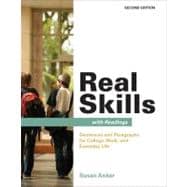Real Skills with Readings offers practical, accessible coverage of basic sentence skills and step-by-step guidance on writing paragraphs. The newest addition to the Anker series, Real Skills continues to motivate students with its message that writing is an essential and achievable skill.
Real Skills provides students clear, concise grammar and writing instruction, special attention to learning styles, and student-to-student advice on succeeding in college. Real-world examples, assignments, and interviews with former students show the relevance of writing to all aspects of students’ lives.








